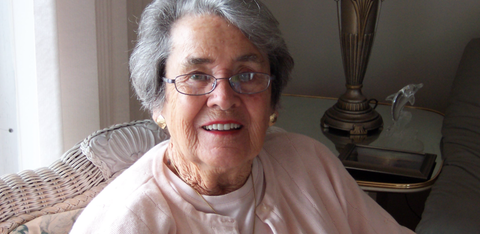Helen Silha passed away on October 21, 2017.
By Jane Kirtley, Silha Professor of Media Ethics and Law
Helen Silha was a force of nature.
That sobriquet is not original to me. It was an observation made by my colleague, Professor Kathleen Hansen, when she learned that Helen had passed away on Oct. 21, 2017, at the age of 98.
I share the sentiment.
I met Helen soon after I was named the Silha Professor of Media Ethics and Law in 1999. When I first moved to Minnesota from Washington, D.C., I initially—and erroneously—assumed that Helen’s role was essentially that of supportive spouse to her husband, the late Otto Silha, the long-time journalist, publisher, consultant and philanthropist. Although both were University of Minnesota alumni who cared deeply about their alma mater, I also assumed—again, erroneously —that, as a former school teacher, Helen probably had only a marginal interest in media law and ethics.
It was certainly true that Helen had plenty of interests and causes of her own, such as organizing classes for the Continuing Education for Women Program at the University of Minnesota and serving on the boards of Minnesota Early Learning Design, COMPAS, and the Edina Special Children’s Group. She was also active in her church, Third Church of Christ, Scientist, in Minneapolis.
But I discovered that Helen was intensely concerned about contemporary issues affecting freedom of the press. Though not an attorney herself, she took a keen interest in the media law topics we explored at the Silha Center, and she loved talking with the prominent media attorneys who delivered Silha Lectures on topics such as libel, privacy, reporter’s privilege, regulation of electronic media, and national security. In fact, when the Silha Research Assistants and I sat down to talk about what stories we would cover in each issue of the Silha Bulletin, we used Helen as our bellwether. She was an educated and intellectually curious layperson, and we always strove to write our stories with a minimum of legal jargon in a way that Helen, and other readers like her, could appreciate.
Helen also cared—a lot—about ethics, just as Otto had. She sometimes fretted about what she saw as a decline in standards in the traditional mainstream media, and encouraged the Silha Center to address that. Helen also relished Silha Center events focusing on unusual topics, such as the ethics of restaurant reviewing. She adored the Silha Lecture by editorial cartoonist Chip Bok, delighting in the political caricatures he sketched during his presentation—especially the ones he presented to her.
Helen remained very much involved in Silha Center events, rarely missing any of them. Always a gracious hostess for our receptions, she attended the 2017 Silha Lecture less than three weeks before her death. Helen read the Silha Bulletin and our other publications faithfully, and would sometimes call me just to chat about something we had written or to comment on an interview I’d given to the news media. She took a personal interest in the academic and professional progress of our graduate and law student Silha Fellows and Research Assistants, and was very proud of my travels in the United States and abroad to speak about freedom of the press and media ethics, spreading the word about the Silha Center’s mission. I was thrilled when she wrote me that, “We are all so pleased with the way the Silha Center is working under your direction.” Helen was by no means an easy grader, and I knew her strength of character and integrity would preclude insincere flattery. A compliment from Helen really meant something.
I hope that the Silha Center can continue to serve as a living testament to Helen Silha’s values, her vision, and her memory. All of us at the Silha Center will miss her very much.
